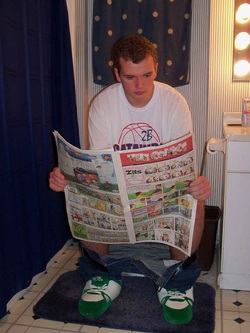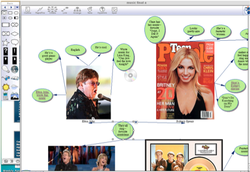
I love to read. Breakfast doesn't taste the same without the morning newspaper. The beach is not the same experience without a good book (or two). The go-to birthday and Christmas gifts for me are books. Time in the bathroom would seem wasted if I didn't have a good book for those few minutes. Too much information?
Certainly my home environment provided major advantages. My mother was a preschool teacher and my father an English and American Studies professor. My maternal grandmother was always reading (and copying) recipes, devotionals, and Bible verses. My paternal grandfather, despite not finishing high school, was always reading Popular Mechanics, Reader's Digest, gardening magazines, Civil War histories, and more. My cousin and I traded Hardy Boy books, my back issues of Sports Illustrated for his back issues of The Sporting News, and baseball books during family beach weeks. There were books in every room in our house when I was growing up, magazine and newspaper deliveries to the door, stops at the Readmore to pick up the Sunday NY Times.
And the summer. Oh, the summer. Even better. The neighborhood summer baseball games were interrupted once a week for the whole gang to visit the public library's bookmobile. Better than the ice cream truck because we could go inside the spacious, air-conditioned van, and the driver/librarian would read aloud to us. And the free magazines! All those copies of Time, Newsweek, Look, Sport Magazine, and more that the college students had neglected to have forwarded to their home addresses, were available for anyone who wanted them in a box at the campus post office window.
School was more of a mixed bag. Completed more than a few of those pleasure-killing book reports, reading tests, multiple choice tasks, and a forest worth of worksheets. Went almost insane in reading groups having my comprehension, fluency, and enjoyment impaired by whatever students were stumbling along, taking their turn reading aloud their paragraph or page. And, no doubt, I returned the favor when it was my turn to read aloud. I struggled mightily with mounds of syllable worksheets, trying to figure out whether horse was one syllable or two, hor/se, whether caterpillar was ca/ter/pil/lar or cat/er/pil/lar or cat/erp/il/ler or... We memorized texts like Fleas, "Adam had'em," and Hamlet soliloquies, "Fie on ’t, ah fie! 'Tis an unweeded garden that grows to seed. All things rank and gross in nature possess it merely..."
But no matter how many skillsheets we completed, sentences we diagrammed, book reports we regurgitated, we also read lots, and were read to, and we talked with each other and our teachers about what we were reading. In public school. At every grade level. My kindergarten teacher read aloud to us every day, as did my first grade teacher, and second grade teacher, and even my third grade teacher, who yelled at Bradley for hiding his own book in his lap (but never took it away from him), so he could read it during math and social studies and science class. My upper elementary, junior high, and high school teachers read aloud to us and gave wide latitude in our reading choices for assignments. Nearly every teacher and nearly every grade level had an in-class collection of books and handed out the Scholastic book orders. We were required to read some texts together and talk about them at length, but we also got to pick from equally lengthy lists of books for many assignments. Mr. McGowan handed us 5 pages of classics from which we could choose weekly and then assigned a Friday written reflection where we related the text to something in our lives. And so I read, by choice, The Plague and To Kill a Mockingbird, Lord of the Flies, Of Mice and Men, and The Old Man and the Sea, but skipped Great Expectations and Beowulf until college required them.
That's what too many schools have forgotten in the craze to raise test scores, in the creation of standard upon standard upon standard to achieve, in no child being left behind while we race to the top. Of what? Assessed knowledge apparently. No matter how good or bad the instruction my own public school teachers provided, they also provide time to read what we wanted (sometimes from lists of what they wanted us to want), to be read with, and to talk about our reading with others.
By contrast, my youngest son was required to read Cormac McCarthy's The Road over the summer in high school, and, without any in-class discussion, take a test on it during the first week of school. Had to make sure those untrustworthy students did what they were told over the summer apparently, and read what many rate as one of the bleakest, most depressing, devastatingly sad books of all time. Might have been more interesting to ask the kids to write the time honored essay, How I Spent My Summer Vacation.
Certainly my home environment provided major advantages. My mother was a preschool teacher and my father an English and American Studies professor. My maternal grandmother was always reading (and copying) recipes, devotionals, and Bible verses. My paternal grandfather, despite not finishing high school, was always reading Popular Mechanics, Reader's Digest, gardening magazines, Civil War histories, and more. My cousin and I traded Hardy Boy books, my back issues of Sports Illustrated for his back issues of The Sporting News, and baseball books during family beach weeks. There were books in every room in our house when I was growing up, magazine and newspaper deliveries to the door, stops at the Readmore to pick up the Sunday NY Times.
And the summer. Oh, the summer. Even better. The neighborhood summer baseball games were interrupted once a week for the whole gang to visit the public library's bookmobile. Better than the ice cream truck because we could go inside the spacious, air-conditioned van, and the driver/librarian would read aloud to us. And the free magazines! All those copies of Time, Newsweek, Look, Sport Magazine, and more that the college students had neglected to have forwarded to their home addresses, were available for anyone who wanted them in a box at the campus post office window.
School was more of a mixed bag. Completed more than a few of those pleasure-killing book reports, reading tests, multiple choice tasks, and a forest worth of worksheets. Went almost insane in reading groups having my comprehension, fluency, and enjoyment impaired by whatever students were stumbling along, taking their turn reading aloud their paragraph or page. And, no doubt, I returned the favor when it was my turn to read aloud. I struggled mightily with mounds of syllable worksheets, trying to figure out whether horse was one syllable or two, hor/se, whether caterpillar was ca/ter/pil/lar or cat/er/pil/lar or cat/erp/il/ler or... We memorized texts like Fleas, "Adam had'em," and Hamlet soliloquies, "Fie on ’t, ah fie! 'Tis an unweeded garden that grows to seed. All things rank and gross in nature possess it merely..."
But no matter how many skillsheets we completed, sentences we diagrammed, book reports we regurgitated, we also read lots, and were read to, and we talked with each other and our teachers about what we were reading. In public school. At every grade level. My kindergarten teacher read aloud to us every day, as did my first grade teacher, and second grade teacher, and even my third grade teacher, who yelled at Bradley for hiding his own book in his lap (but never took it away from him), so he could read it during math and social studies and science class. My upper elementary, junior high, and high school teachers read aloud to us and gave wide latitude in our reading choices for assignments. Nearly every teacher and nearly every grade level had an in-class collection of books and handed out the Scholastic book orders. We were required to read some texts together and talk about them at length, but we also got to pick from equally lengthy lists of books for many assignments. Mr. McGowan handed us 5 pages of classics from which we could choose weekly and then assigned a Friday written reflection where we related the text to something in our lives. And so I read, by choice, The Plague and To Kill a Mockingbird, Lord of the Flies, Of Mice and Men, and The Old Man and the Sea, but skipped Great Expectations and Beowulf until college required them.
That's what too many schools have forgotten in the craze to raise test scores, in the creation of standard upon standard upon standard to achieve, in no child being left behind while we race to the top. Of what? Assessed knowledge apparently. No matter how good or bad the instruction my own public school teachers provided, they also provide time to read what we wanted (sometimes from lists of what they wanted us to want), to be read with, and to talk about our reading with others.
By contrast, my youngest son was required to read Cormac McCarthy's The Road over the summer in high school, and, without any in-class discussion, take a test on it during the first week of school. Had to make sure those untrustworthy students did what they were told over the summer apparently, and read what many rate as one of the bleakest, most depressing, devastatingly sad books of all time. Might have been more interesting to ask the kids to write the time honored essay, How I Spent My Summer Vacation.

 RSS Feed
RSS Feed
